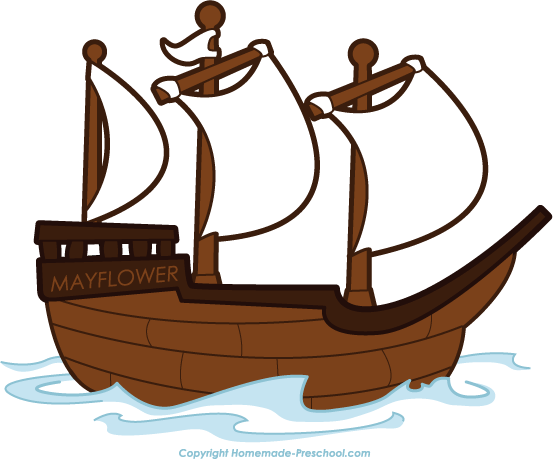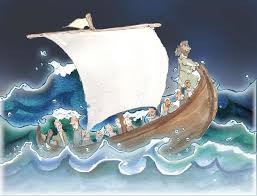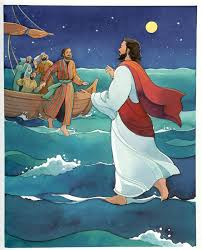John 6:16-17 – When evening came, his disciples went down to the sea, got into a boat, and started across the sea to Capernaum. It was now dark, and Jesus had not yet come to them.
 Immediately after the feeding of the five thousand, a serious problem occurred. No sooner were the 12 baskets of scraps gathered up, when the people wanted to make Jesus a king. That may not sound so bad, but remember, Herod had just put John the Baptist to death; any hint of insurrection would have produced a similar fate for Jesus. It was not God's will for Jesus to be made king, but it wasn't his will for Jesus to be beheaded before the crucifixion either.
Immediately after the feeding of the five thousand, a serious problem occurred. No sooner were the 12 baskets of scraps gathered up, when the people wanted to make Jesus a king. That may not sound so bad, but remember, Herod had just put John the Baptist to death; any hint of insurrection would have produced a similar fate for Jesus. It was not God's will for Jesus to be made king, but it wasn't his will for Jesus to be beheaded before the crucifixion either.
This was a tense situation. All of us are well aware that crowds can be uncontrollable and wild. People can and will do things in/with a crowd which they would never do on an individual basis. And once a crowd has decided upon a course of action, it is incredibly difficult to reason with them. The apostle Paul tried to reason with crowds on several occasions, with mixed results (Acts 14:8-20, Acts 21:18-22:22).
In this case, Jesus instructed the twelve to get into the boat and leave, while he dealt with the multitude. Due to the intense situation, the disciples probably didn't want to leave Jesus alone; they must have waited for him as long as they could.
But eventually it became dark and they started off. The weather, we assume, was fine at that time. (If a storm had been brewing, it would have provided the disciples with a good excuse to remain on the shore even longer.)
Our translation says they 'started across the sea' to Capernaum. The King James 2000 Version and the American Standard Version say they 'went over the sea' towards Capernaum. The NIV says they 'set off across the lake'.
The point is, that when we read the phrase 'across the sea', we assume that the disciples were trying to traverse the sea/lake from the western shore (which was where the miracle took place), to the eastern shore. But this was not the case.
The coastal cities of Capernaum, Bethsaida and Tiberius were all on the same side of the sea/lake – the western shore. However, the terrain is very difficult in that area. It would have been much faster and easier to sail from one city to the other, rather than trying to cover the distance on land. This would explain why they sailed there instead of walking.
John tells us that the disciples were headed for Capernaum. Since he was on the boat, he would know. However, he might be summarizing what actually happened.
In the gospel of Mark, we find Jesus instructing the twelve to go to Bethsaida:
Mark 6:45 - And immediately he made his disciples to get into the ship, and to go to the other side before unto Bethsaida, while he sent away the people.
Although the ultimate goal was to return to Capernaum, Jesus may have wanted them to take the boat to Bethsaida, where he would eventually catch up with them and they would all sail to Capernaum together (Mark 6:45).
It is also possible that the disciples did indeed set out for Bethsaida, but due to the storm, they had no choice but to make for Capernaum. In either case, what the disciples thought would be a routine trip was turning out to be something else entirely.
Meanwhile, Jesus is dealing with the crowd. After squelching their plans to make him king and sending them all home for the night, he quietly slipped away. Going back up the mountain, he found a place of solitude and entered into a season of prayer with the Father (Matthew 14:23, Mark 6:46).
Why would Jesus choose that particular time for extended prayer? Could it be that the actions of the crowd represented a very real temptation for Jesus? Here was a group of people who not only offered but almost forced human honor upon him.
But Jesus did not give into the temptation of pride or vain glory. He stuck to the plan God had outlined – he would indeed be glorified as King of Kings, after bearing the burden of sin and suffering death on the cross (I Timothy 6:14-16, Revelation 17:14).
Scriptures show that Jesus had private devotions with his Father all throughout his earthly ministry. Shutting himself away with God allowed him to resist pride and other temptations. It kept him on his course. That being the case, can we do any less? If we do not spend time in communion and prayer with God, how can we overcome temptation? How can we know and accomplish the will of God without being full of Holy Spirit (Zechariah 4:6)?
John 6:18 – The sea became rough because a strong wind was blowing.
Rowing a boat on this lake must have seemed like an easy task for these men, as several of them were former fishermen. No doubt, they had been on this very body of water many times before. But what they thought was a routine assignment quickly turned into something else entirely.
The disciples are able to row about 3-4 miles before a storm blows in. It is dark/late at night, they are tired and now a storm threatens to engulf them.
One of two things must be true: Either the wind was so strong they couldn't get the boat to shore, or they purposely kept the boat well away from the shore, fearful that the boat would be destroyed on rocks. Either way, they certainly seem to be in a state of fear and panic.
 Now, ask yourself this question: Were the disciples in the middle of a storm during the dead of night because of their own decision/choice? No! They were crossing the lake as the result of a direct command of Jesus. This means they were smack dab in the middle of God's will, yet they were in the midst of a storm.
Now, ask yourself this question: Were the disciples in the middle of a storm during the dead of night because of their own decision/choice? No! They were crossing the lake as the result of a direct command of Jesus. This means they were smack dab in the middle of God's will, yet they were in the midst of a storm.
Let's look at this situation from a spiritual perspective. Spiritually speaking, we use the word 'storm' as a euphemism for trials or tribulations. This means you can be sailing along in life, doing the will of God as you were instructed, and you can run right into a trial! In fact, it is almost a guarantee.
Here's another question: Could Jesus have kept them from being out on the lake during the storm? Yes! He certainly knew the storm was coming. He could have told them to wait for him on shore, or he could have taken them with him to the place of prayer. But instead, Jesus allows them to encounter this storm. He allows their way to be dark, so they cannot clearly see the path forward.
Spiritually speaking, I bet that most of us consider trials/tests/tribulations as negative occurrences and we seek to avoid them at all costs. But this is not the viewpoint of God. Trials are one of the many methods he uses to help us grow and mature in our faith.
1 Peter 4:12-13 - Beloved, think it not strange concerning the fiery trial which is to test you, as though some strange thing happened unto you: But rejoice, since you are partakers of Christ's sufferings; that, when his glory shall be revealed, you may be glad also with exceeding joy.
As we saw in our last post, Jesus tested Philip by asking him how he was going to feed the multitude. Holy Spirit will often allow us to encounter a storm/test/trial in order to reveal what is deep within our hearts (Deuteronomy 8:2). If it is something that needs to be circumcised from our heart/life Holy Spirit is there to assist.
 The storms/trials of life also help us to increase our faith. Think of it this way: faith is a lot like a muscle – the more you use it, the bigger, stronger and more defined it becomes. Since trials force you to use your faith, they build up your faith and your spiritual endurance. They prepare you for new levels of ministry and responsibility in the kingdom of God. They are actually good for you!
The storms/trials of life also help us to increase our faith. Think of it this way: faith is a lot like a muscle – the more you use it, the bigger, stronger and more defined it becomes. Since trials force you to use your faith, they build up your faith and your spiritual endurance. They prepare you for new levels of ministry and responsibility in the kingdom of God. They are actually good for you!
Here is something to consider: Your trial will always result in a testimony. If you pass through the storm with a steady confidence in God not only will your faith grow, but it will build up the faith of others. It will forge a bond between you and others who experience a similar storm (I Thessalonians 3:2-4).
For example, if your doctor diagnosed you with cancer, that would be a storm of hurricane proportions! But if there was someone else in your church that had already had cancer and passed through that trial, wouldn't their experience be a comfort to you? Wouldn't you like that person to pray for you and encourage you? Don't you feel you could bring your questions and concerns to them, since they had first-hand experience with cancer? If you handle your trial correctly, it not only matures you, it will be a big help to your brothers and sisters in Christ.
Of course, the converse is also true. If you fail in your trial by whining, complaining and blaming God for your situation, that also creates a testimony – a negative one that glorifies Satan while discouraging the family of God.
What kind of testimony will you have after your next storm?
One final point: If we are honest, most of us will admit that we have a tendency to hide our trials from others in the body of Christ. We don't want other people to know that we have problems. Perhaps we feel they will judge us or reject us. Perhaps we don't want to seem weak or 'unspiritual'. But as we noted, it is important that we share the trials we face, so we can bear one another's burdens and help each other in our walk of faith.
John 6:19 – When they had rowed about three or four miles, they saw Jesus walking on the sea and coming near the boat, and they were frightened.
Why would the disciples be afraid when they saw Jesus? Don't you think they would have been relieved? According to Matthew (14:26) and Mark (6:49), the reason they were afraid is they thought Jesus was a ghost! They imagined a dark demonic spirit coming to get them!
 In their defense, it was dark so Jesus probably looked like a black shape moving across the water. The last thing they expected was that shape to be a person, so they assumed it was a demon spirit. No doubt, we would have jumped to the same conclusion, because in our experience people just don't walk on water!
In their defense, it was dark so Jesus probably looked like a black shape moving across the water. The last thing they expected was that shape to be a person, so they assumed it was a demon spirit. No doubt, we would have jumped to the same conclusion, because in our experience people just don't walk on water!
Spiritually speaking, we often imagine our trials to be much worse than what they really are. Our initial fear and dread tend to make that mole hill appear as a mountain. But remember, Jesus tells us that our faith can move that mountain and cast it into the sea (Mark 11:22-24). If God has allowed that storm into our lives, we can be sure that his divine purpose is going to be accomplished in us; the storm will result in our good and his glory, even if we find it painful.
As if the multiplication of the fish and loaves were not enough, the disciples get yet another astonishing glimpse of the divinity of Christ as he walks on the water – he is sovereign over nature. Did you know that the scriptures speak about God walking on water?
Job 9:8 – Who [God] alone spreads out the heavens, and treads upon the waves of the sea.
If God alone can tread or walk upon the waves of the sea, and Jesus is doing that very thing, the only logical conclusion is that Jesus is God!
What is the spiritual significance of this? When your storm or trial looks the bleakest, take your eyes off the waves and look for Jesus! You will find him there, walking on the water with you, showing you that he is sovereign over your situation. He never appears early or late; he reveals himself at the perfect time and he brings peace with him.
John 6:20 – But he said to them, "It is I; do not be afraid."
The disciples thought they were in a place/situation where Jesus couldn't reach them – but they were wrong! Jesus always, always comes to the comfort and aid of his people in every situation. Here are just a few examples:
- When Paul and Silas were in jail, God manifested himself in their praise and worship (Acts 16).
- When John (the author of this gospel) was banished to the island of Patmos, God showed up and gave him the book we know as Revelation.
- When Gideon hid in a winepress to thresh out some wheat, God was there with plans of deliverance (Judges 6).
There is no place you can go where God cannot reach you:
Psalm 139:8-10 - If I ascend up into heaven, you are there: if I make my bed in Sheol, behold, you are there. If I take the wings of the morning, and dwell in the uttermost parts of the sea; even there shall your hand lead me, and your right hand shall hold me.
Are you in the midst of a storm or trial right now? You are not alone. Jesus is right there with you, saying, "It is I; do not be afraid."
John 6:21 – Then they were glad to take him into the boat, and immediately the boat was at the land to which they were going.
At this point in time, the apostle Matthew informs us that Peter requested to leave the boat and join Jesus in walking on the water. Afterwards, as Peter and Jesus get into the boat, the wind ceased (Matthew 14:26-32).
Boy, are the disciples glad to see Jesus! They joyfully welcomed him into the boat. They know that when he comes into the midst of their boat/situation, everything will turn out right. Just being in his presence brings peace and courage to their hearts.
Isaiah 43:2 - When you pass through the waters, I will be with you; and through the rivers, they shall not overflow you: when you walk through the fire, you shall not be burned; neither shall the flame scorch you.
John also tells us that once Jesus was in the boat, it immediately was at land.
 Question: Does this indicate another miracle? Why or why not?
Question: Does this indicate another miracle? Why or why not?
Not surprisingly, scholars disagree. Those who feel it was another miracle, simply take John's words at face value – after Jesus entered the boat, the wind died and the boat was miraculously transported to the dock at Capernaum. It is certainly within the power of God to do such a thing.
But others disagree. They note that God does not perform miracles in cases where man is capable of getting the job done. For example, in Luke 22 we find that the time of Passover is at hand. Jesus could have supernaturally had a meal prepared for that celebration; it was certainly within his power to do so. But he doesn't. Instead, he instructs Peter and John to go and prepare the Passover (Luke 22:8), because it was well within their power to do so. No miracle was needed.
Now let's examine the present case. The word "immediately' is better translated as 'straight away' or without further delay. Whereas the boat was previously being tossed around during the storm and not making any progress towards the shore, it was now back under the control of the disciples. The storm passed, the wind died down, and they piloted the boat to shore as they normally would on any other occasion. No miracle was needed.
Regardless of which scholars you think are correct, we can all agree that difficulty and danger were transformed to peace and safety when Jesus was received into the situation.
When you enter into a storm/trial (hint: if you're not in one now, one is undoubtedly on the horizon), bring Jesus into your situation by praying, confessing your faith, using your spiritual authority, and/or speaking the promises of God. If a miracle is needed, Jesus will provide one!
John 6:22-23 – On the next day the crowd that remained on the other side of the sea saw that there had been only one boat there, and that Jesus had not entered the boat with his disciples, but that his disciples had gone away alone. Other boats from Tiberias came near the place where they had eaten the bread after the Lord had given thanks.
John now describes what occurred on the 'other side of the sea' or the location where the miracle of the loaves and fish took place.
The crowd that wanted to make Jesus king was aware that there had only been one boat on the shore when they spent the day with Jesus. After dinner, as Jesus was sending his disciples over the sea to Bethsaida and/or Capernaum, they decided that Jesus was the Messiah and they attempted to make him king.
However, Jesus refused this honor. He sent the crowd home and retired higher up on the mountain to spend time in prayer. This much we know to be fact.
Now for some conjecture. What was the crowd thinking?
Here is one explanation: If Jesus sent his disciples away to another location in the only boat available, it must mean that he didn't really want to leave them. It must mean that he DOES want to be crowned king, but he is just being modest. So the crowd resolves to return the next day, find Jesus, and once again attempt to make him king. But when the next day dawns, he is nowhere to be found.
Here is another explanation: The crowd, being fully aware that Jesus is the Messiah, wants more interaction with him. They want to see more miracles and get more free meals (kind of like dinner and a movie). Since the only boat left the shore last night, Jesus must still be present on their side of the sea, so they go to find him. But he is nowhere to be found.
Regardless of what the crowd was thinking, one thing is certain – Jesus has left the area; he is no longer at the location of the miracle. The crowd is sure that Jesus is in the process of returning to Capernaum, probably on foot.
John 6:24-25 – So when the crowd saw that Jesus was not there, nor his disciples, they themselves got into the boats and went to Capernaum, seeking Jesus. When they found him on the other side of the sea, they said to him, "Rabbi, when did you come here?"
In the meantime, boats from Tiberius showed up at the place of the miracle. These boats carried both goods and passengers, so the people bought tickets and sailed to Capernaum, looking for Jesus.
According to their calculations, they would be at Capernaum long before Jesus, since he must be walking and they took the boat. But when they arrived, there he was! They were so surprised they begin to question when and how he arrived.
John 6:26 – Jesus answered them, "Truly, truly, I say to you, you are seeking me, not because you saw signs, but because you ate your fill of the loaves."
Jesus does not bother to answer their question. Instead, he gets right to the heart of the matter – literally. What is in the hearts of the multitude who came to Capernaum seeking Jesus?
Jesus reveals they are not seeking him because of the miracles, but because of the food. But John has already stated that these people were excited about the miracles they saw; they were prompted to believe in Jesus as the Messiah because of them. So what did Jesus mean?
The purpose of the miracles was to confirm the gospel message. They were a sign from God that Jesus was the Messiah. If these people would have truly embraced Jesus and his message, they would have repented. They would have submitted themselves to his teaching. They would have looked for entrance to the kingdom of heaven not only for themselves, but for others. Their main focus would have been their spiritual lives.
But instead, we find their interest in miracles is superficial; they are only interested in the miracles as a confirmation that Jesus can give them a happy and comfortable existence in this life. This is why they wanted to make him king. In their hearts, they view Jesus as a genie who is there to grant their wishes and make their lives easy. They have no interest in being made over into the image of Christ, spreading the gospel or sharing in his suffering.
John 6:27 – "Do not work for the food that perishes, but for the food that endures to eternal life, which the Son of Man will give to you. For on him God the Father has set his seal."
Obviously, Jesus is NOT telling us to quit our jobs and stop working. We need to purchase groceries and other necessities of life. Remember, God himself sanctioned labor when he made Adam and Eve the caretakers of the Garden of Eden (Genesis 2:15).
Again, just to clarify, there is nothing wrong with working for food, education, etc. In fact, we are instructed to do so (II Thessalonians 3:10-12). However, all of these things are temporary. They only last for the duration of our life before vanishing without a trace. Even if you live to the ripe old age of 120, that is a very short amount of time compared to eternity!
In this verse, Jesus is saying that all the concerns of this life (food, clothing, shelter, education, entertainment, money, etc) should be secondary to the spiritual concerns of our soul.
So the wise person also works for that which results in eternal life. And make no mistake, once we have received the free gift of salvation through Jesus Christ, the true Christian life IS work. We must deny ourselves, take up our crosses and follow Jesus.
What does Jesus mean when he says God the Father has set his seal on Jesus?
According to Webster's dictionary, a seal is an engraved or inscribed stamp, used for making an impression in wax (or another soft substance) which is attached to a document and assures authentication. So the seal confirms, ratifies or authenticates something. It assures you that something is true.
 For example, back in the day official letters, laws or legal documents were sealed with a king's signet ring. If a document had such a seal, you could be sure that whatever was on the document was authentic; it was approved by the king and it had his authority behind it.
For example, back in the day official letters, laws or legal documents were sealed with a king's signet ring. If a document had such a seal, you could be sure that whatever was on the document was authentic; it was approved by the king and it had his authority behind it.
So in this case, Jesus is telling the Jews that his purpose or mission (to reveal the gospel, to be the bread of life; to provide eternal life for mankind) has been sealed/sanctioned/commissioned by God the Father. His authority is behind it. No one but Jesus could be prophet, priest and king to the lost and dying race of humans. No one but Jesus has ever had the ability to give eternal life and forgiveness of sin. No one but Jesus could reveal the Father and his divine will to mankind.
John 6:28-29 – Then they said to him, "What must we do, to be doing the works of God?" Jesus answered them, "This is the work of God, that you believe him whom he has sent."
The multitude seems to understand that Jesus has exhorted them to aim or focus on something more than the comforts of this present earthly life.
But at this point, we find a mistake in their understanding. The Jews had long been strict observers of the ceremonial law. They rested upon that law of works for their salvation. So when they ask about doing the 'works of God', they are looking for more physical rites or ceremonies to perform.
But man can never be justified by works. We are justified by faith:
Galatians 2:16 - Knowing that a man is not justified by the works of the law, but by the faith of Jesus Christ, even we have believed in Jesus Christ, that we might be justified by the faith of Christ, and not by the works of the law: for by the works of the law shall no flesh be justified.
Believing in Jesus as the Messiah and placing our faith in him is the 'work' that is most pleasing to God. It is also the foundation of all other Christian works.
For example, we don't go to heaven because we feed the poor. We feed the poor because we have faith in Jesus and follow his commands. Our entrance to heaven comes through Jesus; heavenly riches come from doing good works.
Let me offer you some encouragement:
Jesus shut himself away with God for times of personal prayer. In that time, he found the strength and courage to align himself with the will of the Father. He received wisdom and understanding from Holy Spirit on how to accomplish his earthly mission.
So again we ask this question: How can we do anything less? Are you trying to minister in your own power, with your own wisdom? How is that going for you?
I encourage you to stop and assess your ministry right now. If you are not 100% sure that you are being led by the Spirit of God, spend some time in personal prayer until you are sure you are on the right path.
Let me offer you some relief:
Anytime we encounter a storm or trial in life, it results in a testimony – either negative or positive. None of us are perfect; we may have embraced and published a negative testimony at some point.
If that is the case, ask Jesus to forgive you (even if this is something that occurred long ago). Go before his throne and renounce those negative words; ask Jesus to remove the curse of those words from your life. Then move on in faith and do better the next time!
Let me offer you some strength:
It is important that we understand the role of good works in the life of a Christian. Our motivation is always to do the will of God, which often entails showing His love to those around us through good works.
But sometimes we can get weary, especially when it seems like the needs are so vast we can't meet them all. In those times, just give that burden to the Lord and let him bear it.
Psalms 18:32 – it is God that girds me with strength, and makes my way perfect.
